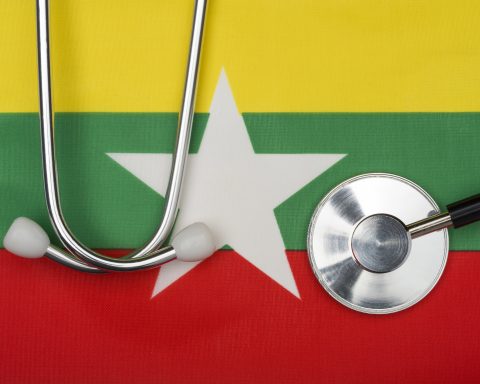
As a GP registrar, the MRCGP Clinical Skills Assessment (CSA) exam is currently at the forefront of my mind. VTS teaching focuses on how to pass, evenings are spent revising, and my bank account, now £1700 lighter, still makes me shudder. And yet, perhaps naively, it was still a shock to me to find out that at no point in the CSA exam am I expected to accurately detect real clinical signs. Of course, the CSA assesses many other important skills, including problem solving skills, person-centred care and attitudinal aspects. My argument is certainly not with the inclusion of these. However, given that ‘the validity of the CSA resides in its realistic simulation of real-life consultations,’ it seems strange that it includes no real patients, and consequently no real physical signs, both somewhat important components, I would argue, of many real-life consultations.
By contrast, the clinical component of Membership of the Royal College of Physicians (MRCP), the PACES exam (Practical Assessment of Clinical examination skills), involves real patients with a given condition. Candidates undertake a respiratory, abdominal, cardiovascular and neurological exam, as well as a history station, communication and ethics station, and two brief clinical consultations. In these, candidates are given eight minutes with a patient to take a focused history, carry out a relevant examination, respond to the patient’s concerns, and explain a management plan. This PACES exam is robust, and considered a rite of passage for medical trainees, who often require multiple attempts to pass. To a GP trainee it often seems unattainably tough. When colleagues pass, we congratulate them, but we also breathe a sigh of relief that we don’t have to go through the same arduous process, and in doing so, we perhaps elevate our colleagues above ourselves.
I would argue this is wrong on many levels.
This veneration of MRCP gives the impression that our exit exams are ‘easier’, or that we couldn’t pass a more robust exam should we need to. As a GP trainee who decided to undertake my MRCP exam, I would argue this is far from the truth. When I first started revising for the exam, I was met with a mix of attitudes. Confusion from many other trainees (why on earth would I put myself through such an arduous process when I didn’t have to), despair from my husband (yet another set of costly exams and weekends revising), and downright derision from my programme directors, who actively discouraged me from taking the exam as it would be a ‘distraction’ from ‘becoming a good GP’. But having been through the process, I can argue sincerely that I have little doubt I am a much better GP as a result. Revision involved seeing and examining vast numbers of patients and I now have much greater confidence in my ability to detect signs and synthesise clinical findings appropriately, quickly, and under pressure.
The two brief clinical encounters are pretty much as close to a real life GP consultation as you can get, and preparing for this was directly relevant to my day to day practice in GP. The sophisticated communication skills training I have received as a GP trainee was invaluable for the history and communication stations. The feedback I regularly receive from my GP trainers was far more meaningful and insightful than that given at expensive revision courses run by eminent hospital consultants, and is something I truly value as a result. Attending revision courses and practicing with colleagues really made me appreciate the art of consulting that we spend much time and effort honing, particularly as I watched others tying themselves up in nots over ethical dilemmas and breaking bad news scenarios that would be bread and butter to a GP trainee.
But more than just the relevance of the exam and the associated learning, gaining my MRCP has taught me so much more. It was a hard, but an eminently passable exam. Whilst it is tempting to put medical colleagues who have passed on a pedestal, this is dangerous, and risks exacerbating the disconnect between primary and secondary care. As GPs we are more than capable of passing this exam. I spend my days seeing undifferentiated patients, who present with a symptom (or 7!) rather than a diagnosis. Hence, ‘examine this patient with shortness of breath’ didn’t frighten me. I rarely have the results of bloods, imaging or other diagnostic tests on hand to confirm a diagnosis. Hence, detecting and interpreting a patient’s heart murmur without the luxury of an echo wasn’t anything new. Seeing a wide variety of patients in quick succession under considerable time pressure is ‘just another day in the office’ to me.
Furthermore, the revision process made me realise that some of our medical colleagues have an almost laughable lack of understanding of what we do, and what we face, day in day out in primary care. Whilst revising with a hospital colleague, I completed a particularly gruelling viva on pulmonary fibrosis. He was impressed with my answers (helped by a recent respiratory job), but, when he found out I was a GP trainee, exclaimed ‘What a waste! Why does a GP need to know anything about pulmonary fibrosis? You just hear the crackles and refer.’ My jaw dropped with disbelief, and had it not been so sincere, it might have been funny. He couldn’t understand the fundamental role of the GP in managing even the most complex medical patients. Needless to say I took some pleasure in pointing this out to him, but whilst silently sobbing inside.
Who suspects the initial diagnoses, and filters it out from all the others? Who supports the patient and their family through the diagnostic pathway, the treatment, and the inevitable decline? Who is there for anything and everything between their 3 monthly respiratory clinic appointments? Who keeps them out of hospital wherever possible, but negotiates an admission when needed? Who coordinates the vast array of healthcare professionals involved in their care? Of course, their GP. Yes, we value communication skills and holistic care, but we also provide very real medical care too. With foundation exposure to general practice remaining disappointingly low, we really do have a duty to address these disappointingly common misconceptions about what GPs do and the challenges we face.
Finally, and more controversially, I was met in some cases with a prejudice that I, as a GP trainee, wouldn’t be up to the rigorous exam process in a way that my medical colleagues were. The sad truth, that most aren’t willing to acknowledge, is that some secondary care colleagues still presume that people become GPs because they can’t get in to anything else. Several I spoke to were shocked that I had turned down a core medical job to undertake GP training. Most underestimated just how passionately we believe in the crucial role that GPs play, the enormous difference we can make to patient care, and the excellence we can strive to achieve as true generalists. It surprised many that I could be bothered to learn for an exam that wasn’t compulsory – a far cry from the reality of my cohort of GP trainees who have voluntarily undertaken (and paid for) many extra qualifications to further their knowledge and expertise. It gave me some pleasure when these types saw me perform well on a particular station, but that pleasure was far outweighed by the disappointment that this arrogance and lack of respect can still persist within our profession.
However, I believe it is just as much our job to get out there and change these attitudes and to prove our worth, as it is for our hospital colleagues to start recognising and respecting our skills. We still work in a hierarchical system of long held beliefs and prejudices. Until MRCGP is looked on with the same reverence as MRCP, we have work to do. I refuse to be looked down on by colleagues and our exit exam, which seemingly places little emphasis on detecting clinical signs, may actually play into many prejudices about the profession, as a touchy feeling world where failed medics go to see out their days trying to persuade patients with viral URTIs they really don’t need antibiotics and managing mild depression.
So I would argue, perhaps only a little tongue in cheek, we all should be taking PACES. I think back to my revision course colleague and his belief that, as GPs, we ‘hear crackles and refer.’ Passing this exam means yes, I hear the crackles and have confidence in my ability to do so. But, perhaps most importantly of all, just one or two more of my hospital colleagues might also now recognise and value us GPs as the robust, efficient and highly skilled clinical workforce we are, who do so much more than ‘just hear crackles and refer…’










You have made some pertinent observations and I congratulate you on achieving MRCP(UK). I too work as a GP and hold MRCP(UK) and , having worked in GP land for over 10 years, I am of the opinion that it is the process of acquiring MRCP which engenders enduring good habits which, sadly, are not instilled to anywhere close to the same degree by MRCGP. Moreover, to pass MRCP(UK) one needs to have done an array of medical disciplines whereas I have encountered GPs with MRCGP whose general medical experience consists of their house job (?FY1) and a 6 month stint which comprised of 3 months Care of the Elderly and 3 months Rehab only.On a weekly basis I see patients whose results have been ignored or misinterpreted (such as labelling a patient as being in AF because the computer interpretation of a trace says so when clearly P waves are present); correspondence which ignores medication changes or other points of action; physical signs which are evaluated shoddily (eg patients labelled as having aortic stenosis because of a systolic sound at the aortic area-with no consideration to pulse character/apex beat/second heart sound/BP); inappropriate referrals because signs are misinterpreted; poor investigative pathways (eg the buck stops when an anaemic patient has normal haematinics)- the list goes on.
An analogy, if you will:a layman when inspecting a painting may comment on the colours whereas the devoted art critic will infer emotional content. When presented with a patient, the holder of MRCP will see, and extract, much more cogent information than that obtained by a superficial analysis of the information. I accept the GPs role is not to be the same as the hospital physician, but it is dis-spiriting to see such superficial medicine being practised daily; when pointed out to the purveyors of such practise they do actually (when pushed) have much of the knowledge but they lack the afore-mentioned approach which the MRCP so beautifully bestows.